UPSC Daily Current Affairs- 22nd April 2024 | Current Affairs & Hindu Analysis: Daily, Weekly & Monthly PDF Download
GS-II
India – Australia Bilateral Relationship
Subject: International Relations
Source: Economic Times
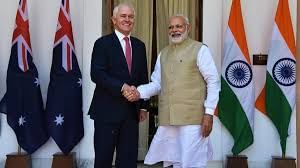
Why in News?
Australia, in its new National Defence Strategy (NDS) 2024, has stated that India is a top-tier security partner for Australia.
- The historical ties between India and Australia began soon after European settlement in Australia in 1788.
- All trade to and from the penal colony of New South Wales was overseen by the British East India Company via Kolkata.
- Diplomatic relations between India and Australia date back to the pre-Independence era, marked by the establishment of the India Trade Office in Sydney in 1941.
- India and Australia elevated their bilateral relationship from a 'Strategic Partnership' in 2009 to a Comprehensive Strategic Partnership (CSP) in 2020.
- Various institutional mechanisms have been established over the years to enhance bilateral cooperation, including high-level visits, Annual Meetings of Prime Ministers, Foreign Ministers' Framework Dialogue, 2+2 Defence and Foreign Ministers' Dialogue, Joint Trade & Commerce Ministerial Commission, Defence Policy Talks, Australia-India Education Council, Defence Services Staff Talks, Energy Dialogue, and Joint Working Groups on various issues.
Bilateral Trade Between India – Australia
- India stands as Australia's sixth largest trading partner.
- Bilateral trade between the two countries surged from US$ 22.2 billion in 2021 to US$ 31.4 billion in 2022, reflecting a 41% increase.
- India's exports to Australia grew by 38% from US$ 6.3 billion in 2021 to US$ 8.7 billion, while Australia's exports to India increased by 42% from US$ 15.9 billion to US$ 22.5 billion.
Civil Nuclear Deal
- A Civil Nuclear Cooperation Agreement was inked between India and Australia in September 2014, allowing Australian uranium mining companies to supply uranium to India for civil purposes.
Indian Community in Australia
- The Indian community in Australia has been growing steadily, with a population of approximately 976,000 as per the 2021 census.
- India ranks as the second largest migrant group in Australia after England, with a continuous influx of students and tourists from India.
IndAus ECTA
- In 2022, a bilateral Economic Cooperation and Trade Agreement (ECTA) was signed between India and Australia, marking India's first trade agreement with a developed nation in over a decade.
- The agreement covers a wide spectrum of economic and commercial relations, encompassing areas such as Trade in Goods, Rules of Origin, Trade in Services, Technical Barriers to Trade (TBT), Sanitary and Phytosanitary (SPS) measures, Dispute Settlement, Movement of Natural Persons, Telecom, Customs Procedures, Pharmaceutical Products, and Cooperation in other Areas.
National Defence Strategy (NDS) 2024
- Australia's National Defence Strategy (NDS) 2024 designates India as a top-tier security partner, emphasizing practical cooperation that bolsters Indo-Pacific stability through the Comprehensive Strategic Partnership.
- The strategy aims to strengthen defense and strategic ties between India and Australia, focusing on exchanges, high-level visits, bilateral and multilateral exercises, and mutual logistics support.
Ayushman Bharat to all senior citizens
Subject: Polity and Governance
Source: Indian Express

Why in News?
Ayushman Bharat Health Insurance scheme expansion pledged for senior citizens during 2024 Lok Sabha elections.
Ayushman Bharat Pradhan Mantri Jan Arogya Yojana (AB PMJAY)
- About
- Initiated in September 2018, covering around 40% of the population, primarily focusing on the poorest and the vulnerable.
- Introduced as the second part of the 'Ayushman Bharat' scheme.
- Objective: Provide medical coverage up to Rs. 5 lakh per family annually for secondary and tertiary care hospitalization to disadvantaged families.
- Eligibility
- Initially aimed to include 10.74 crore impoverished rural families and specified urban workers' families.
- States implementing AB-PMJAY have expanded coverage to include 13.44 crore families (approximately 65 crore individuals).
- Beneficiaries identified through the latest Socio-Economic Caste Census (SECC) data.
- Performance
- Benefits
- Facilitates cashless access to Health Benefit Packages encompassing surgeries, medical treatments, day care services, medication expenses, and diagnostic tests.
- Benefits
- Ayushman Bharat for senior citizens - Necessity
- Reasons
- India's aging population due to declining fertility rates and increasing life expectancy.
- By 2050, the proportion of people over 60 years is expected to rise to 19.5%.
- Challenges include increased health and long-term care costs, labor shortages, financial strains, and old-age income insecurity.
- Insurance Coverage
- Only a small percentage of individuals over 60 are covered by health schemes, with low awareness and affordability cited as primary barriers.
- Disease Burden: Elderly face chronic ailments, infectious diseases due to weakened immunity, with government health expenditure focused on key specialties essential for the elderly population.
- Reasons
The Supreme Court of India
Subject: Polity and Governance
Source: Times of India
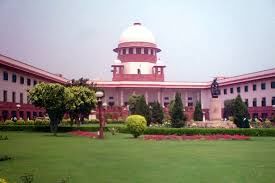
Why in News?
The Prime Minister recently inaugurated the Diamond Jubilee celebration of the Supreme Court of India, emphasizing the court's role in upholding the principles of freedom, equality, and justice envisioned by the framers of the Indian constitution.
Key Features of the Supreme Court of India:
- The Supreme Court serves as the highest appeal court, often considered as the apex court of India and the final recourse for citizens unsatisfied with High Court judgments.
- It holds the authority to advise the President on matters of law and public importance as per Article 143 of the Constitution.
- The Court mediates disputes between the Union and states and among different states, as specified in Article 131.
- Ensuring constitutional compliance, the Supreme Court reviews laws and executive actions, safeguarding citizens' fundamental rights through writs and orders under Article 32.
- The Court can initiate cases in the public interest and has the power of suo moto in certain instances.
Issues/Challenges Faced by the Supreme Court:
- Over 80,000 pending cases in the Supreme Court as of 2023 highlight a significant backlog in the judicial system.
- The debate between Judicial Activism and Judicial Restraint questions the judiciary's role in governance and policy formulation.
- Concerns raised by the Law Commission of India's 230th Report about potential biases in judicial appointments impacting the system's impartiality.
- Tensions between the judiciary and the executive, including delays in appointments and criticisms during the COVID-19 pandemic, have strained the system.
- Issues pertaining to public perception, transparency, accountability, and judicial independence have emerged, affecting trust in the judiciary.
Way Forward:
- Implementing case management systems and utilizing technology like e-filing and video conferencing can enhance efficiency and reduce backlogs.
- Judicial reforms such as increasing judges, enhancing infrastructure, and prompt vacancy fillings can expedite justice delivery and tackle delays.
- Enhancing transparency in judicial appointments and making judgments more accessible to the public can bolster public trust.
- Safeguarding the judiciary from external influences can uphold the system's integrity and independence.
Rwanda Plan of the United Kingdom
Subject: International Relations
Source: Indian Express
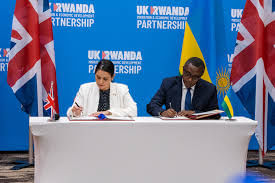
Why in News?
The British parliament is on the verge of approving a controversial law to enable the deportation of asylum seekers to Rwanda. However, there are potential legal obstacles that could delay or thwart this significant policy proposed by Prime Minister Rishi Sunak.
Background
Prime Minister Rishi Sunak, a member of the Conservative Party, has heavily invested political capital in the Rwanda scheme. The success or failure of this initiative could have a pivotal impact on his political career. He has assured that this plan will help prevent unauthorized migrants from entering the country.
About the Rwanda Plan
- According to a five-year agreement, certain asylum seekers arriving in the UK would be sent to Rwanda for their claims to be processed. If their claims are approved, they may be granted refugee status and allowed to remain. If unsuccessful, they could explore other grounds to settle in Rwanda or seek asylum in another "safe third country." No asylum seeker would have the opportunity to apply to return to the UK.
- Under this policy, individuals entering the UK illegally after January 1, 2022, could potentially be relocated to Rwanda without a cap on numbers. Government officials argue that this plan would act as a deterrent for individuals attempting to arrive in the UK via small boats across the English Channel.
- Despite the intentions, no asylum seeker has been transferred to Rwanda yet, a country located in central Africa, approximately 4,000 miles (6,500km) away from the UK. The inaugural flight, scheduled for June 2022, was canceled due to legal challenges. Prime Minister Rishi Sunak has reiterated that flights will commence in the spring but has refrained from specifying a precise date.
Supreme Court Ruling and Rwanda's Safety
- In November 2023, the UK Supreme Court declared unanimously that the Rwanda scheme was illegal. The court expressed concerns that genuine refugees could face risks if returned to their home countries, where they might encounter harm. This ruling was found to be in violation of the European Convention on Human Rights, which prohibits torture and inhuman treatment, a treaty to which the UK is a signatory.
- The court also raised apprehensions about Rwanda's poor human rights record and its treatment of refugees in the past. In 2021, the UK government itself criticized Rwanda for instances of "extrajudicial killings, deaths in custody, enforced disappearances, and torture." Furthermore, a specific incident in 2018 involving Rwandan police firing on protesting refugees was highlighted.
Rwanda Bill Contents
- Following the Supreme Court ruling, the government introduced a bill aimed at affirming in UK law that Rwanda is a safe country. This legislation, which necessitates approval from both Houses of Parliament, instructs the courts to overlook crucial sections of the Human Rights Act, seeking to circumvent the Supreme Court's decision.
- Additionally, the bill mandates the courts to disregard other British laws or international regulations, such as the international Refugee Convention, that might impede deportations to Rwanda.
GS-III
NATIONAL SECURITY GUARD (NSG)
Subject: Defense and Security
Source: Indian Express
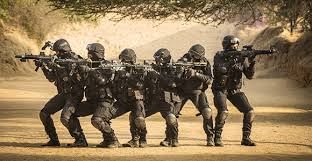
Why in News?
Senior IPS officer Nalin Prabhat has been appointed as the Director-General of National Security Guard (NSG).
Background:
The NSG plays a crucial role in safeguarding India from terrorist threats and ensuring security in critical situations.
About NATIONAL SECURITY GUARD (NSG):
- The National Security Guard (NSG), also known as the "Black Cats," is a specialized anti-terrorism unit in India.
- It operates under the Ministry of Home Affairs.
- Established on October 16, 1984, post the Operation Blue Star.
Mission and Vision:
- Mission: To train, equip, and maintain a specialized force capable of effectively combating terrorism. The motto is "Sarvatra Sarvottam Suraksha" (Everywhere and Always Supreme Security).
- Vision: Aspire to be a world-class "zero error force."
Role and Functions:
- Anti-hijack operations: In charge of responding to hijacking threats.
- Rescue operations: Providing assistance in times of crises.
- Tough support: Backing up Central Para Military forces.
Composition:
- The NSG is composed of officers and personnel from the Central Armed Police Forces, Indian Army, and State Police Forces.
How Crime GPT is Using AI to Help Police Forces with Crime Detection?
Subject: Science and TechnologySource: Indian Express

Why in News?
The flagship product of a Gurugram-based tech startup (Staqu Technologies) - Trinetra 2.0, is set to revolutionise the way security forces approach criminal investigations, by integrating a powerful language model called Crime GPT.
What is the Origin of Crime GPT?
- In 2018, the company created Trinetra 1.0, a platform that allows police forces to digitise their criminal records, including photographs and other key details.
- Its next phase - Trinetra 2.0, is harnessing AI to unlock the potential of this data by adding the GPT, which can also analyse the unstructured data in the form of text.
How does Crime GPT Work?
- The startup developed a customised LLM that has been trained on a massive database of over 9,00,000 criminal records from Uttar Pradesh.
- By integrating Retrieval-Augmented Generation (RAG) techniques, the model can provide accurate and factual responses.
- For example, if a police officer is looking for a suspect charged with IPC Section 307 (attempt to murder), the Crime GPT will provide the suspect's history, associated crimes, and even list police stations with his recorded offences.
How is AI-powered Crime GPT Revolutionising Investigative Capabilities?
- This advanced technology allows for custom inputs, enabling the police force to access detailed information on persons of interest and criminals swiftly and accurately.
- Crime GPT efficiently processes both written and audio inputs, providing prompt retrieval of critical information, thereby expediting ongoing investigations and streamlining procedural formalities.
- Other Indian states are showing keen interest in adopting this technology due to its efficiency and effectiveness.
Fourth Global Mass Coral Bleaching
Subject: Environment and Ecology
Source: BBC
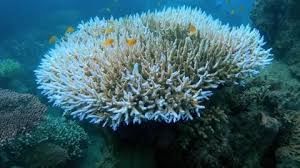
Why in News?
As reported by the US National Oceanic and Atmospheric Administration (NOAA), there has been a recent triggering of the fourth global mass coral bleaching event due to exceptionally high ocean temperatures.
Corals and Coral Reefs
- Corals are marine organisms that remain fixed to the ocean floor, using their tentacles to capture food and sustain themselves.
- Each coral unit, known as a polyp, forms colonies of hundreds to thousands of genetically identical polyps.
Types of Corals
- Corals are broadly categorized as hard coral or soft coral.
- Hard corals have sturdy limestone skeletons produced by coral polyps, differentiating them from soft corals.
Coral Reefs
- Hard corals play a pivotal role in constructing coral reefs, elaborate structures that evolve over millennia.
- The Great Barrier Reef in Australia, spanning approximately 2300 kilometers, stands as the largest coral reef globally.
Significance of Corals
- Biodiversity Hotspots: The Great Barrier Reef hosts a diverse array of species, including corals, fish, mollusks, and sea turtles.
- Protection: Coral reefs act as natural barriers, absorbing a substantial portion of wave energy and safeguarding coastlines.
- Economic Value: Supporting industries like fishing and tourism, coral reefs are vital for numerous livelihoods worldwide.
- Medicine and Science: Corals present potential for medical breakthroughs, having already contributed to treatments for various ailments.
- Carbon Cycling: By sequestering carbon dioxide, corals contribute to regulating the Earth's climate.
Coral Bleaching
- Symbiotic Relationship: Corals yharbour algae called zooxanthellae, forming a mutually beneficial alliance.
- Coral Bleaching Process: Due to stressors like temperature changes, corals expel zooxanthellae and turn white, a phenomenon known as bleaching.
- Global Implications: Global mass bleaching events, triggered by rising temperatures, pose significant threats to coral reefs worldwide.
It's crucial to address these challenges to preserve the biodiversity and ecological balance of our oceans.
FOOD SAFETY AND STANDARDS AUTHORITY OF INDIA (FSSAI)
Subject: Economy
Source: The Hindu

Why in News?
In May 2023, FSSAI formed a committee to address concerns related to nutraceuticals and highly processed foods, emphasizing sustainable standards and the reduction of adulteration.
About FSSAI:
- FSSAI is an independent statutory body established under the Food Safety and Standards Act, 2006.
- It functions under the Ministry of Health & Family Welfare, Government of India, headquartered in Delhi.
- The FSS Act, 2006 consolidated multiple food safety-related legislations previously managed by different entities.
Functions:
- Formulating regulations for food safety standards and guidelines.
- Issuing licenses and certifications for food businesses to ensure compliance with safety standards.
- Establishing protocols for food testing laboratories.
- Providing guidance to the government on policy formulation in the realm of food safety.
- Collecting data on food contaminants and managing associated risks.
- Developing a national information network dedicated to food safety.
- Promoting awareness among the public regarding food safety and standards.
Legislative Framework:
- The FSS Act aims to centralize all matters concerning food safety and standards.
- It led to the establishment of FSSAI and State Food Safety Authorities in each state.
- The Food Safety and Standards Rules, 2011, introduced provisions for the Food Safety Appellate Tribunal and the Registrar of the Appellate Tribunal.
|
51 videos|5377 docs|1138 tests
|
FAQs on UPSC Daily Current Affairs- 22nd April 2024 - Current Affairs & Hindu Analysis: Daily, Weekly & Monthly
| 1. What is the significance of the India-Australia bilateral relationship? |  |
| 2. How does Ayushman Bharat benefit senior citizens in India? |  |
| 3. What is the role of the National Security Guard (NSG) in India's security framework? |  |
| 4. How is AI being used by Crime GPT to assist police forces in crime detection? |  |
| 5. What is the significance of the Fourth Global Mass Coral Bleaching event? |  |





















